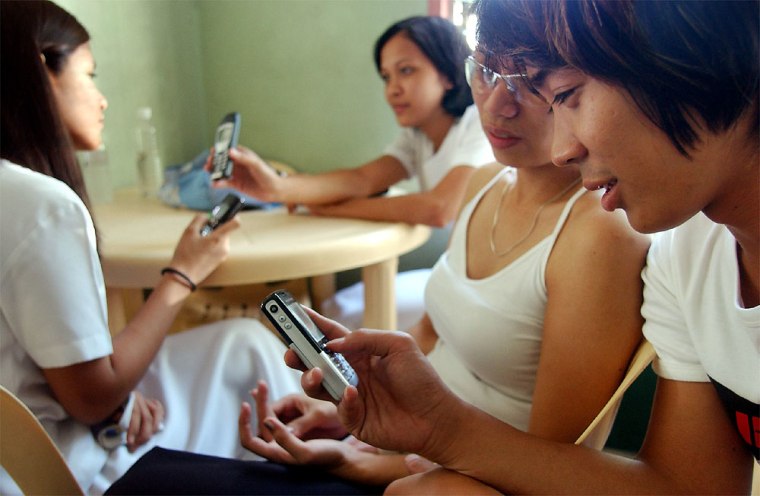From political messages to erotic chitchat, text messages are the favored means of communication across Europe and Asia these days.
"Texting" is cheaper and faster than using a cell phone and is gaining converts daily, even as the phenomenon makes only slow inroads in the United States.
More than 2 billion text messages are sent every month, mostly in Europe and Asia. An estimated 8 out of 10 people under 25 in the United Kingdom are more likely to text than make a call on their cell phones, according to surveys.
Apart from the low cost, texting allows users to communicate a short message instantly, without actually having to talk.
In most cases, it is a discreet form of communication, although soccer star David Beckham may live to regret some X-rated messages he allegedly sent.
His former personal assistant, Rebecca Loos, said she had an affair with Beckham. Her proof: a series of text messages so explicit that they were mostly depicted in the normally brazen British tabloid press with asterisks.
Beckham's wife, ex-Spice Girl Victoria, as well as Loos’s husband have denied the allegations. Meantime, the British public continues to speculate about the actual content of all of those texts.
Modern courtship
Caron Cooper discovered the potential of text when she started up a long-distance relationship.
Based in Wiltshire, where she runs a country hotel and restaurant, Cooper was interested in an antiques dealer in Corsica. The early stages of the courtship were mostly conducted by text messaging, and she said, "It was one of the most erotic experiences I ever had."
The beauty of texting is that you can do it in social situations without being obvious, according to Cooper.
At one point, she was introduced to a potential suitor in London at dinner in a restaurant while she was engaged in text conversation with her friend in Corsica.
"There I was in Soho, eating Chinese, and getting the most unbelievable messages.” Her dinner companions, including her blind date, were blissfully unaware of her steamy texts.
Cooper is not alone. Apparently 7 percent of all texts sent in Britain are flirtatious in nature.
As Cooper pointed out, "You have no inhibitions. I said all sorts of things I would never have said in person."
Practical uses, too
Not all text messages are used in romantic liaisons. There are many practical applications as well.
One doctor in Coventry has decided to use text messages to remind his patients of their appointments. Texts have been known to save lives. When Rachel Kelsey was stranded in a blizzard in the Swiss Alps, she texted a friend in London, and that led to her helicopter rescue.
Politically inspired text messages have also gained major currency in the presidential election in the Philippines this year.
By the time Filipinos go to the polls on May 10, the average voter will have received hundreds of messages about the various candidates ranging from important campaign information to scurrilous rumors about the opposition.
It is a technology easy to master, using your thumbs and the keypads on your cell phone. However there is an art to sending a message within 160 characters. You also need to learn basic text lingo.
Users tend to skip vowels. XLNT means excellent. RUOK or CUL8TR may be easy enough to translate. But only the inner text circles know that HAND means Have A Nice Day. There is also an entire range of characters with meanings such as :) for a smiley face, or (((hug)))) for hugs.
For those who require more translation, they can refer to the Concise Oxford Dictionary. The editors of the revised edition have acknowledged that some text "words" such as BBLR (be back later) are now part of the English language. GR8!
